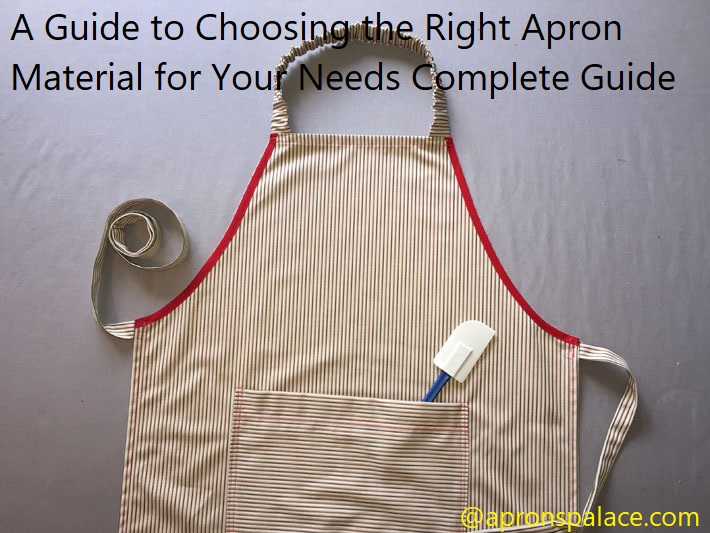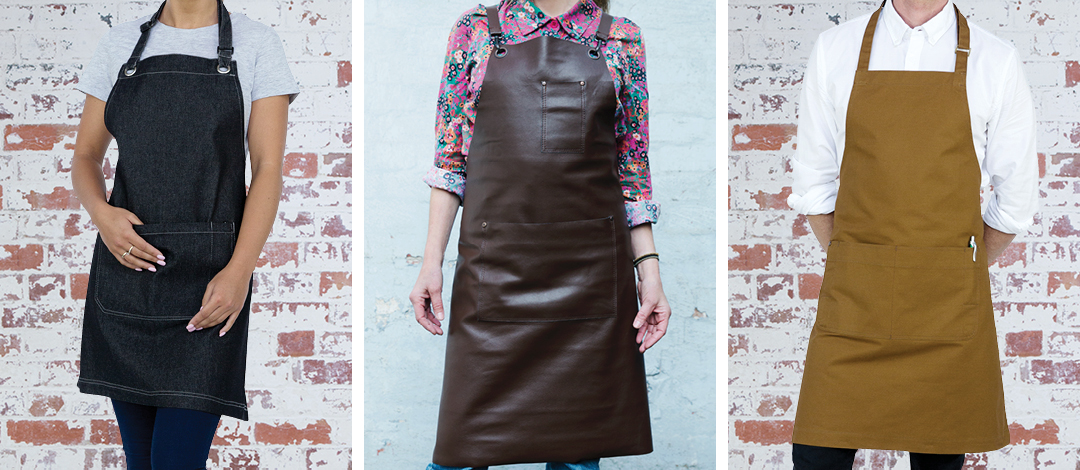Are you struggling to find the right apron material for your needs? You’ve come to the right place!
This guide will help you navigate the complexities of choosing the right apron material. From durability to comfort, this guide will ensure that you have the perfect apron for any project.
When choosing an apron, selecting the right material is paramount. Not only can the material determine how comfortable you are while wearing the apron, but it can also influence the durability and maintenance of your garment.
From poly-blends to knit fabrics and leather aside, there are many types of materials available for aprons today. To help narrow down your choices, consider the primary factors that affect fabric selection: comfortability; washability; chemical resistance; environmental impact; and flexibility.
This guide will provide an overview on different types of apron materials and their capabilities according to each factor, so you can make an informed decision about which fabric best suits your needs. In addition, there are tips on when different materials should or should not be used.
Definition of Aprons
An apron is a piece of clothing that is worn to protect the body from mess and spills while in a kitchen, restaurant, laboratory, or other work environment. An apron can also be worn to complete an outfit or display one’s fashion sense. Aprons come in many different styles, shapes, sizes and materials. Different materials are used for various types of aprons for various purposes; these include cotton, polyester, vinyl, leather and some other synthetic fabrics.
Cotton aprons are often chosen for work attire in restaurant kitchens as they provide all day comfort and are easy to wash at home. Cotton is breathable and does not retain heat or sweat from being in the kitchen all day long. However, with all the spills that come along with being in any kind of working space, it pays off to opt for more durable material such as polyester which wipes down easily without staining too quickly.
Polyester is often used to make waterproof aprons that resist stains better than cotton because of its water-repellent properties; however it is less comfortable than cotton in hotter working environments due to its lack of breathability. Vinyl aprons are great for any chef who wants their apparel to look fresh throughout the entire shift as this fabric does not absorb any liquids and does not mold like cotton or polyester wold eventually do when exposed to liquids over long periods of time.
Leather aprons are heavy duty due to their rugged nature which makes them ideal for blacksmiths or metallurgists who need protective clothing while performing tasks such as welding or metalworking due to their fireproofing properties. Finally there are certain synthetic fabrics available on the market which offer even better protection against fireproofing yet have less water resistance than leather making them more suitable for kitchen duties instead of industrial ones.

Importance of Aprons
Aprons have become an indispensable essential for restaurant and food service workers. They are a practical and protective garment that every chef, bartender, server, prep cook and busser should have. The purpose of an apron is to protect clothing and skin from food prep spills, splashes and heat damage while working in the kitchen or serving tables. In addition to being practical, stylish aprons can also offer wearers with a sense of professionalism and confidence.
When it comes to choosing the right material for your needs, there are several factors to consider. Your choice should depend on how much protection you need and your budget. Before selecting any fabric or material for your apron, you should think about what type of environment you’re working in – whether it’s wet or dry – as well as other important features like waterproofing, stain resistance and durability. Here is some information on the types of fabrics used for aprons:
Polyester: Polyester is extremely durable with excellent colorfastness making it ideal for all types of rugged use; plus it’s stain-resistant! Polyester can also be easily laundered due to its water-resistant properties making them perfect for restaurants with heavy duty washing requirements.
Cotton: Cotton is naturally breathable meaning that perspiration will evaporate off quickly allowing you to stay cooler in hot temperatures. Cotton can either be woven or knit depending on the weight chosen but usually cotton aprons are pre-shrunken so they won’t shrink even after being washed; this makes them great if you need multiple washes over time! The downside with cotton however is that if not treated correctly then items may fade, shrink or stretch over time due to wear and tear so check care instructions first before buying!
Denim/Canvas: Lastly denim/canvas aprons are incredibly durable making them perfect for industrial use or even light construction environments; because denim never goes out of style everyone will always appreciate the classic look it brings too!
Purpose of Guide
The purpose of this guide is to provide comprehensive information on various types of aprons and their materials, as well as factors to consider when making a selection. It is intended to be a resource for cooks and restaurateurs who need information on the best materials for their needs.
We will look at how different materials vary in terms of absorption, comfort, sturdiness, and even appearance. Additionally, we’ll explore which type of material is best for certain applications such as bakers’ aprons or chef’s coats. Armed with this knowledge, you’ll be ready to make an informed decision when choosing an apron material for your specific requirements!
Factors to Consider When Choosing Apron Materials
When selecting the best apron material for your work, it’s important to consider the characteristics of materials that will provide a comfortable fit and suitable protection. Different materials can have different amounts of protection from various hazards, from fire and chemicals to wetness and splashes.
Moreover, factors such as color durability and cost should be taken into consideration when deciding on the right apron material for those applications. To make an informed decision on the right material for you, consider the following attributes:
-Weight: Apron weight will determine comfortability. Lightweight aprons may be suitable in areas where you don’t need thick protective coverage. On the other hand, thicker or heavier fabrics are often necessary when dealing with hazardous materials or extreme temperatures.
-Tear resistance: Factors such as how often you wipe your aprons down with water or chemicals, or wear them in extreme weather conditions (such as working outdoors) should be taken into account when selecting fabric based on tear resistance levels.
-Heat resistance: If you are working around temperatures of 250°F (121°C) or more, you should select fabrics that meet heat standards such as flame-resistant materials like Nomex® fabric (see Table 1). Most cottons are not considered flame resistant but can meet heat requirements if treated with special finishes and coatings–speaking with an expert is always recommended for heat loss prevention knowledge.
-Colorfastness: Many times uniforms incorporate specific colors to represent a brand or company name, so selecting durable fabrics that retain their dyes is essential in maintaining quality control standards over time – study dyes used on any fabric before making any purchase decisions based on color accuracy requirements – too many dye face can lead to fading faster than expected !
Purpose of the Apron
- Purpose of the Apron:
The purpose of an apron is dependent on the individual and their needs. Some aprons are meant to demonstrate professionality in the workplace, others serve a functional purpose such as protecting clothing from dirt or debris, and some are simply meant for decorative purposes. It is important to consider your needs when selecting the type of apron material to use so you can pick the most appropriate one for your requirements.
- Types of Materials:
The types of materials used for aprons vary widely depending on its purpose and intended use. The common materials include cotton canvas, linen, leather, synthetic suede fabric (sometimes called vegan leather), denim/chambray/twill, PVC-coated polyester cloth, waxed canvas, X-mono fabric (100% solution-dyed polyester) and other specialized fabrics like fire retardant material or waterproof material. Each type of material has its own advantages and disadvantages that should be taken into consideration before making a purchase decision.
Comfort
When it comes to choosing the right apron material for your needs, comfort should always be a leading factor in your decision. Cotton aprons are lightweight, breathable, and affordable. It is a great material for those who are looking for something light and breathable. The downside to cotton aprons is that they absorb moisture quickly, meaning that any spills will eventually soak through the fabric. For this reason, it’s best used for light-duty tasks where spills and messes are minimal.
Polyester is another lightweight material commonly used in the production of aprons due to its strong fibers which can withstand frequent wear and tear. Additionally, unlike cotton, polyester wicks away moisture quickly meaning that any spills or messes won’t seep into the fabric and cause damage or discoloration. Polyester aprons are popular with restaurant workers due to their low cost and easy-to-clean properties.
High-end aprons may be constructed from materials such as vinyl or canvas which offer increased durability than cotton or polyester fabrics. Vinyl offers excellent protection from water-based spills while canvas provides more protection from sharp edges and abrasions–perfect for industrial applications such as carpentry or mechanics’ workshops. Whichever material you choose, be sure to find an apron that is both comfortable against your skin while offering adequate protection against dirt and liquid messes.

Durability
Durability is an important factor to consider when choosing an apron as different materials provide different levels of durability. Some materials tend to last longer and are more resistant to staining, tearing and fraying.
Linen is a strong, lightweight and lint-free fabric that provides excellent durability. It’s also highly absorbent, so it’s great for areas where spills are common.
Denim is also extremely durable as well as being resistant to fading and wrinkling. Cotton aprons provide good durability but may fade or shrink over time if not properly cared for.
Polyester blends offer good abrasion resistance, tear strength and colorfastness for longer-lasting use, while acrylic canvas aprons are designed with an ultra-durable water barrier construction to help protect against the elements.
Common Apron Materials
An apron is an essential tool for people to use in all sorts of job settings. It is important to consider various factors in making the right choice for you. Materials are specifically important as it defines the durability, comfort, and resistance of the apron. The most common materials used for aprons include denim, leather, canvas, and cotton. Each material has its own unique characteristics that make it suitable for certain purpose and user preferences.
Denim/Jean: Denim or Jean aprons are strong and rugged which makes them ideal for heavy duty use in hazardous environment such as mechanic garages or restaurant kitchens. The material retains stains well so it’s also ideal for creative fabric application or logo display on corporate uniforms.
Leather: Leather offers maximum protection from sharp objects and extended wearing due to its durable texture and long lasting life span. It is often used in manufacturing workplaces or manual labor sites as it is a heavy-duty material that further gives off a sleek look when polished regularly.
Canvas: Canvas provides excellent stain resistance which makes them suitable for medical setting such as doctors offices and dentist clinics. Aprons made with canvas look crisp when laundered frequently while appearing neat at all times due to its wrinkle-resistant quality which makes them highly desirable among professionals who want to uphold their corporate image throughout their daily activities onsite
Cotton: Cotton aprons provide moderate protection against minor spills like oil splatters with minimal heaviness than comparison with leather and denim options. It’s lightweight feature allows more flexibility during work movements without compromising the protection quality of it either way. Though sleek in appearance, cotton might wear off after continuous washing therefore plain colors offer an easy maintenance option against dyed fabrics overtime when it comes to handling multiple washes at commercial laundry service providers.
Cotton
Cotton aprons are extremely popular and versatile. This natural fiber is comfortable to wear, absorbs moisture well, and is available in a wide variety of colors, prints, and textures. Cotton can hold up after frequent washings but may shrink slightly with each cycle.
However, cotton may not be the best choice for areas that require an extra measure of protection as it isn’t water resistant. Depending on the grade of cotton used, some fabric blends may be more durable than others.
Polyester
Polyester is a popular fabric choice for aprons, due to its durability and low cost. Different polyester weaves are available that vary in density and weave structure. For example, polyester twill is a heavy-duty apron material that resists snags and holds its shape well, whereas polyester poplin has a more open weave and is lightweight but not as strong.
Polyester can also be blended with cotton to make fabrics such as oxford or ripstop, which have some of the benefits of both fabrics. Polyester fabric is inherently wrinkle-resistant, making it a great choice for busy restaurants or other commercial kitchens who want an easily maintained uniform that still looks presentable.

Conclusion
When it comes to finding the right apron material for your needs, there are many factors to consider. From its durability and water-resistance to its comfort, breathability, and stain-resistance, different types of materials offer a range of benefits. The best course of action is to take the time to do some research and determine which material best suits your particular needs before you make a purchase. It will ultimately be up to you to decide which type of apron material will deliver the desired results for you.
No matter what type of apron fabric you end up choosing, all options are designed with the ultimate goal of making sure that you get maximum protection from spills and splashes while staying comfortable, safe and stylish. With so many options available on the market today, it should be easy enough to find an apron fabric that not only meets but actually surpasses your expectations—all while remaining within your budget constraints!
FAQ’s
How do I choose an apron fabric?
Consider the durability, ease of cleaning, and comfort of the fabric.
What is the best material for a cooking apron?
Cotton or cotton blends are commonly used for cooking aprons as they are breathable and easy to clean.
What are the 5 materials needed for making an apron?
Fabric, thread, scissors, measuring tape, and a sewing machine or needle and thread.
What are the three materials used in making apron?
Fabric, thread, and a closure (such as a tie or snap).
How do you make a good apron?
Choose a sturdy fabric, consider the design and fit for your needs, and pay attention to the finishing details such as hems and closures.
What are the qualities of apron?
Some qualities of a good apron include durability, comfort, and ease of cleaning.
What are two types of aprons?
Two types of aprons are waist aprons and bib aprons.
What is the classification of apron?
Aprons can be classified by their design (such as waist or bib), their purpose (such as cooking or welding), or their style (such as vintage or modern).
How many types of aprons do we have?
There are numerous types of aprons, including but not limited to waist aprons, bib aprons, cobbler aprons, pinafore aprons, and smock aprons.
What is the thickness of aprons?
The thickness of aprons can vary depending on the fabric used and the intended purpose of the apron. Some aprons may be thin and lightweight, while others may be thicker and more heavy-duty.
See more-
- Best kids aprons 2023
- Best welding aprons 2023
- Best workshop aprons 2023
- Best work aprons 2023
- Best woodworking aprons 2023

Douglas Keefer is the CEO and author of apronspalace.com and Informative Website. With his extensive knowledge and expertise in the world of aprons, he has helped thousands of people find the perfect apron for their needs. Douglas’s commitment to transparency and honesty has made apronspalace.com stand out in a sea of biased reviews and sponsored content. He is a true pioneer in the world of aprons and a passionate advocate for the culinary arts


